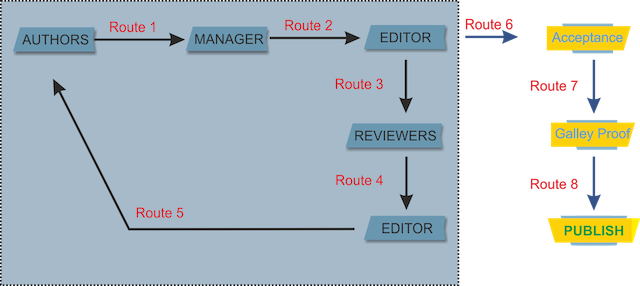The reviewing process will take into account the novelness, objectivity, methodology, scientific impact, conclusion, and references. Reviewer feedback will be forwarded to the relevant author for any necessary actions or answers. Based on the reviewer's suggestion, the editorial board will consider the reviewer's opinion before sending the corresponding author the final decision about the submission.
Canrea Journal operates a single-blind review process in which the authors' identities are revealed to the reviewers while reviewers’ identities are concealed from the authors. Papers deemed suitable for the journal will be typically sent to a minimum of two independent expert reviewers or external reviewers to assess the paper's scientific quality. The Managing Editor and Editor-in-Chief are responsible for the final decision regarding the acceptance or rejection of articles.
In the event of delays, the Managing Editor will ask editorial board members to review the articles. Or, in a rare case, the authors will be asked to suggest reviewers.
In the event of delays, the Managing Editor will ask editorial board members to review the articles. Or, in a rare case, the authors will be asked to suggest reviewers.
The Editorial Board of the Canrea Journal will choose reviewers who are qualified in their area and must review all declarations of potential conflicts of interest made by reviewers to see whether there is any possibility of bias. Research articles are required to normally be evaluated by a minimum of two independent reviewers, and if the Canrea Journal editorial board deems it essential, they will seek further input such as adding a third reviewer or so on. The Canrea Journal Editorial Board is obligated to adhere to the best practice guidelines that has been supplied by the Publisher in order to prevent the appointment of fraudulent peer reviewers.
Reviewing process will consider novelty, originality, objectivity, method, scientific impact and conclusion. Reviewers' comments will be sent to the corresponding author for necessary actions and responses. The Editorial Board will evaluate the reviewer’s comment and then send the final decision regarding the submission to the corresponding author based on the reviewer's recommendation.
Canrea Journal Editorial Board, author, and reviewers shall use the electronic submission system for all journal communications and make appropriate use of Canrea plagiarism screening using Turnitin Similarity Check. The following diagram provides specific information on the process from author submission to editor acceptance.
The steps point number 1 to 5 are considered as 1 round of the peer-reviewing process (see the grey area in the figure). The editor or editorial board considers the feedback provided by the peer reviewers and arrives at a decision. The following are the most common decisions:

- Manuscript Submission (by author) (route 1).
- Manuscript Check and Selection (by manager and editors) (route 2). Editors have a right to directly accept, reject, or review. Prior to further processing steps, plagiarism check using Turnitin is applied for each manuscript.
- Manuscript Reviewing Process (by reviewers) (route 3-4).
- Notification of Manuscript Acceptance, Revision, or Rejection (by editor to author based on reviewers comments) (route 5).
- Paper Revision (by author).
- Revision Submission based on Reviewer Suggestion (by author) with the similar flow to point number 1. (route 1).
- If the reviewer seems to be satisfied with revision, notification for acceptance (by editor). (route 6).
- Galley proof and publishing process (route 7 and 8).
The steps point number 1 to 5 are considered as 1 round of the peer-reviewing process (see the grey area in the figure). The editor or editorial board considers the feedback provided by the peer reviewers and arrives at a decision. The following are the most common decisions:
- Accepted, as it is. The journal will publish the paper in its original form;
- Accepted by Minor Revisions, the journal will publish the paper and asks the author to make small corrections (let authors revised with stipulated time);
- Accepted by Major Revisions, the journal will publish the paper provided the authors make the changes suggested by the reviewers and/or editors (let authors revised with stipulated time);
- Resubmit (conditional rejection), the journal is willing to reconsider the paper in another round of decision making after the authors make major changes;
- Rejected (outright rejection), the journal will not publish the paper or reconsider it even if the authors make major revisions.
The Canrea Journal Editorial Board is responsible for maintaining the privacy of all submissions to the journal and correspondence with reviewers. The editorial board of Canrea Journal will also see to it that writers are not aware of the reviewers' identities (single blind review method).
The Journal's policy on the disclosure of conflicts of interest by authors and reviewers shall be followed by the editorial board of Canrea Journal. The Canrea Journal Editorial Board will provide assistance and direction to authors and reviewers at every stage of the publication process.
